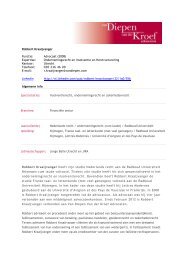© Van Diepen Van der Kroef Advocaten
© Van Diepen Van der Kroef Advocaten
© Van Diepen Van der Kroef Advocaten
- No tags were found...
Create successful ePaper yourself
Turn your PDF publications into a flip-book with our unique Google optimized e-Paper software.
cannot perceive any legal construction other than identification that could here beinvolved.52. The consi<strong>der</strong>ation of the District Court that the State of the Netherlands as party to theproceedings has other procedural powers than the Public Prosecutor’s Department is herenot relevant. In fact the District Court accorded the State of the Netherlands many moreprocedural powers than it would an ordinary party. The issue here is whether the State ofthe Netherlands has an international obligation and whether that gives rise to a sufficientinterest. It was discussed above already that there did not exist an obligation to leave nomeans untried in or<strong>der</strong> to guarantee the immunity of the UN (and certainly not by way ofoverriding the most important treaties) by the deployment of procedural means. That thePublic Prosecutor’s Department does not have the possibility of going on appeal may be truein itself but there is no obstacle to the Public Prosecutor’s Department again issuing anadvisory opinion un<strong>der</strong> Article 44 CCPr in a case on appeal. All of this must be viewedagainst the background that the UN itself choose not to enter an appearance. Thepostulated interest of the State of the Netherlands is and remains an interest that isinferred from that of the UN. The State of the Netherlands would have an internationalobligation, while the UN (in whose interests the obligation would have been created)chooses not to exercise their rights. Un<strong>der</strong> those circumstances nothing should stand in theway of the Court’s jurisdiction.53. The conclusion of ground of appeal 5 is that the State of the Netherlands has no interest tobe upheld at law. Bringing the interim motions has impeded the establishment of the truthand the State of the Netherlands has a party upon whose shoul<strong>der</strong>s it can heap the blamewithout any adverse consequence. The District Court consequently failed to un<strong>der</strong>standun<strong>der</strong> legal consi<strong>der</strong>ation 5.7 that the possible defence open to the State of the Netherlandsagainst the claim against it should not have been in issue. That defence (that has beenadvanced since 1995, namely, that it was not the Netherlands but the UN that wasresponsible), gives insight into the actual interest of the State of the Netherlands. The Stateof the Netherlands intended in the interim proceedings only to advance that actual interest.These are not noble principles <strong>der</strong>ived from international law but exclusively political endsdesigned to shift blame and impede truth-finding in or<strong>der</strong> to prevent damage to the imageof the State of the Netherlands and liability for compensation.<strong>©</strong> <strong>Van</strong> <strong>Diepen</strong> <strong>Van</strong> <strong>der</strong> <strong>Kroef</strong> <strong>Advocaten</strong> page 22 of 99
















